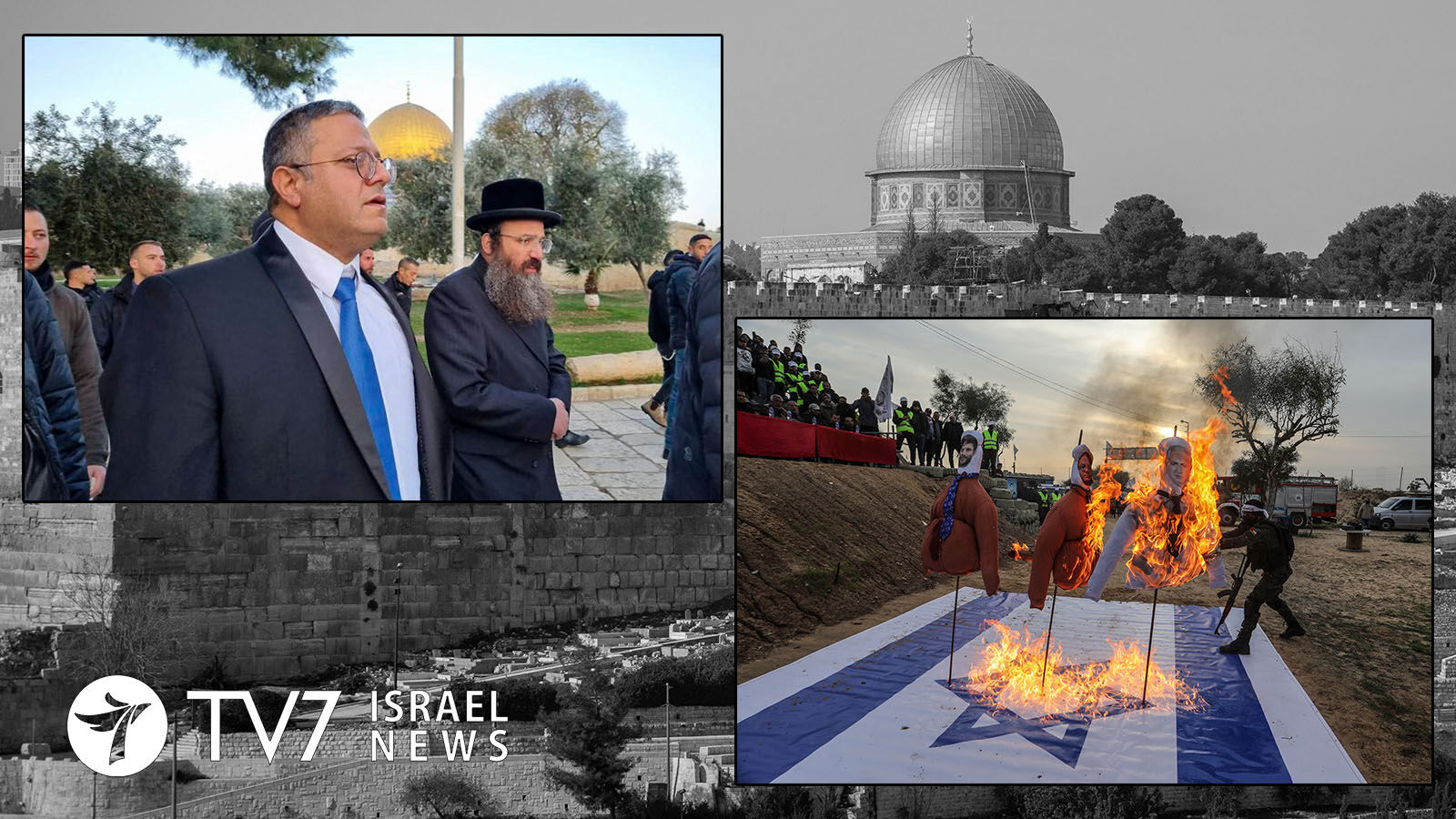By Erin Viner
Fury by Palestinians and their supporters erupted after new Israeli National Security Minister, Member of Knesset (MK) Itamar Ben-Gvir made a brief visit to the Temple Mount in Jerusalem’s Old City yesterday.
“The Temple Mount is open to all,” Minister Ben-Gvir wrote on Twitter, after video footage showed him walking on the periphery of the compound surrounded by a heavy security detail while accompanied by a fellow Orthodox Jew.
The area is considered by the Jewish People as the holiest site in the world, also revered to Christians. It is regarded as the third most sacred site in Islam, following Mecca and Medina in Saudi Arabia. Muslims, who built the Dome of the Rock and Al-Aqsa Mosque atop the ruins of the biblical temples refer to the contested land as Haram al Sharif, or the Noble Sanctuary. Symbolizing Palestinian statehood aspirations, it is the most sensitive site in their conflict with Israel.
Even though Israel regards the entirety of of Jerusalem as its eternal capital and the center of the Jewish faith, it has observed the “status quo” arrangement that existed prior to its reunification of Jerusalem following the 1967 Six Day War, that bars Jewish prayer at the compound as not to ‘inflame Muslim anger.’ Religious worship on the al-Aqsa compound is restricted to Muslims, while Jews pray at the Western Wall nearby.
During his 15-minute visit, Ben-Gvir did not approach the mosque. An Israeli official insisted the 15-minute visit by Ben-Gvir complied with an arrangement that allows non-Muslims to visit but not pray.
Even though he has previously called for an end to the prayer ban, the Minister been non-committal on the issue since joining the new Netanyahu-led government.
The Prime Minister’s Office (PMO) was swift to address the issue.
“Prime Minister Benjamin Netanyahu is committed to strictly maintaining the status quo, without changes, on the Temple Mount. We will not be dictated to by Hamas. Under the status quo, ministers have gone up to the Temple Mount in recent years, including Public Security Minister Gilad Erdan; therefore, the claim that a change has been made in the status quo is without foundation,” said a statement issued by the PMO.
Despite that reassurance, Palestinian President Mahmoud Abbas announced his intention to seek condemnation of the visit by the United Nations Security Council, reported the Palestinian WAFA News Agency. During an address to his cabinet, Palestinian Prime Minister Mohammad Shtayyeh called on Palestinians to “confront the raids into Al Aqsa Mosque,” claiming the visit was staged as part of an effort to turn the shrine “into a Jewish temple.” Earlier, the Palestinian Foreign Ministry issued accused “the extremist minister Ben-Gvir” of “storming of Al-Aqsa Mosque” in what it deemed to be “an unprecedented provocation and a dangerous escalation of the conflict.”
A spokesman for the Islamist Hamas terror group that controls Gaza that rejects Israel’s right to exist, warned, “A continuation of this behavior will bring all parties closer to a big clash.”
The leader of the Lebanon-based, Iranian-terrorist proxy Hezbollah group, Hassan Nasrallah, stated that any infringement of the status quo would lead to an explosion in the entire region, not just within the Palestinian territories.
Jordan, the custodian of Al Aqsa and whose 1994 peace deal with Israel is unpopular domestically, summoned the Israeli Ambassador for a diplomatic reprimand. The Jordanian Foreign Ministry condemned the visit in “severest” terms,” claiming that the “storming of the mosque” had violated its sanctity, as well as international law and “the historic and legal status quo in Jerusalem.”
The United Arab Emirates, which normalized ties with Israel in 2020, also condemned what it called the “storming” of the al-Aqsa Mosque compound,” reported the WAM state news agency. Fallout apparently included the postponement of a slated visit to the UAE by Prime Minister Netanyahu.
Israel’s 1979 peace partner Egypt also condemned the visit.
Turkey, which recently resolved its long-running diplomatic rift with Israel, condemned the visit as “provocative” as well. Also using terms “provocative” and the “storming of the mosque, Saudi Arabia joined the regional dissent over the Ben-Gvir visit.
International bodies have also expressed concern.
UN Deputy Spokesman Farhan Haq said that Secretary-General Antonio Guterres “calls on all to refrain from steps that could escalate tensions in and around the holy sites.”
United States Ambassador to Israel Thomas Nides said Washington “has been very clear in conversations with the Israeli government on the issue of preserving the status quo,” while a White House National Security Council spokesperson said any unilateral action that jeopardizes the status quo of Jerusalem holy sites is unacceptable.
The European Union’s Mideast Envoy Sven Koopmans also insisted the status quo must be maintained.
It is important to note that objection has also been expressed in Israel, including by leading ultra-Orthodox Jewish figures supporting Israel’s coalition government.
“It is forbidden to go up to the place of the Holy of Holies,” senior United Torah Judaism lawmaker Moshe Gafni said at the Knesset, referring to a part of Jewish temples that stood at the site in ancient times and was off-limits to most people. Revealing that he previously advised Ben-Gvir of this, he added, “Besides the aspect of religious law, there is nothing to be gained from just goading the entire world.” he said.
Ben-Gvir responded to Gafni on Twitter, writing: “The Temple Mount is not just a religious matter…It is also a symbol of sovereignty and governance, and the enemy measures us up in accordance with our conduct there.”
The office of Israel’s Chief Sephardi Rabbi Yitzhak Yosef said he had sent Ben-Gvir what it called a “protest letter … urging the minister not to go up to the Temple Mount again.”
Underscoring that, “Even if claimed that a rabbinical minority has personally permitted you to do this,” the letter stressed, “it is clear that as a minister in the government of Israel you must not take action against the instructions of the Chief Rabbinate dating back generations.”
